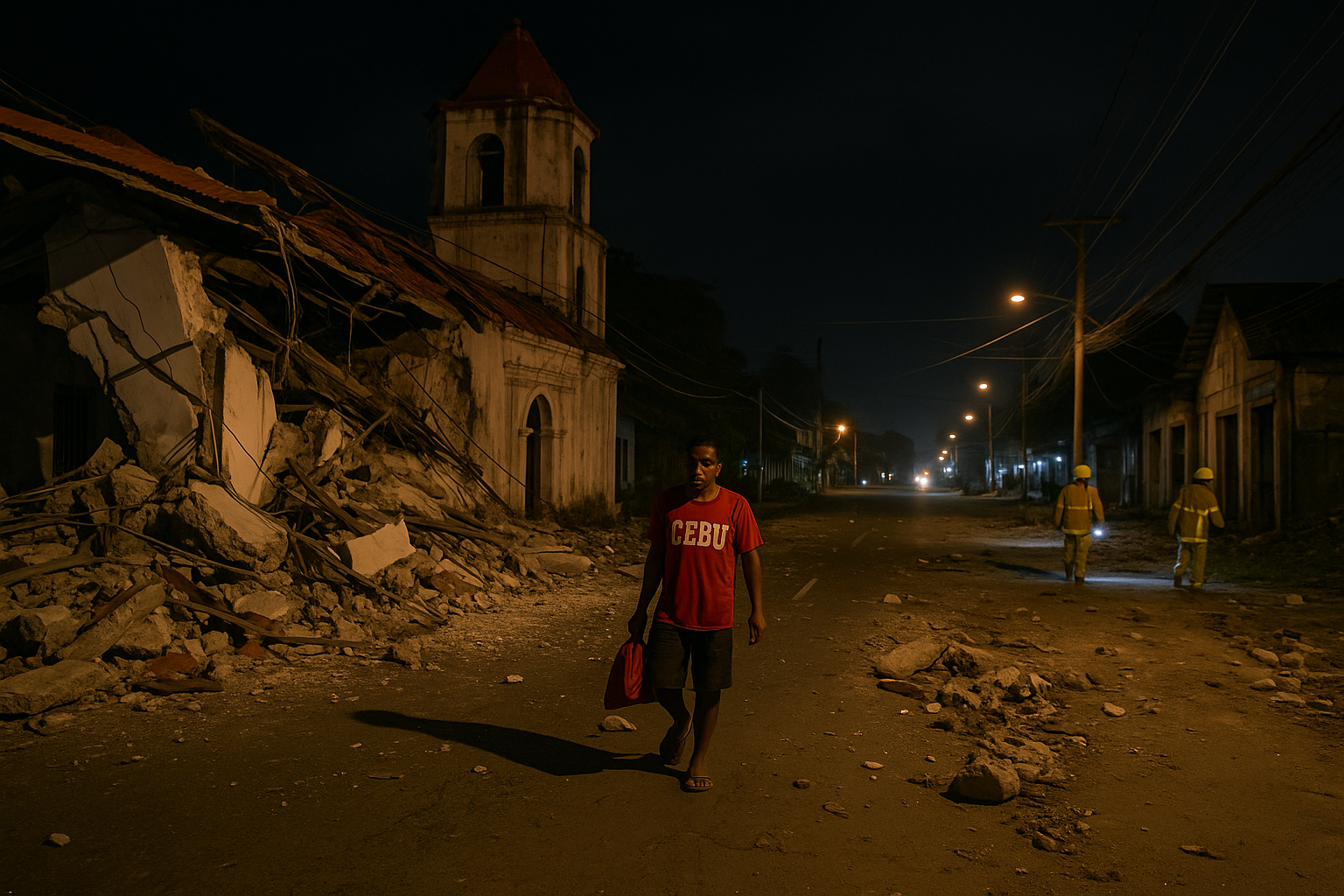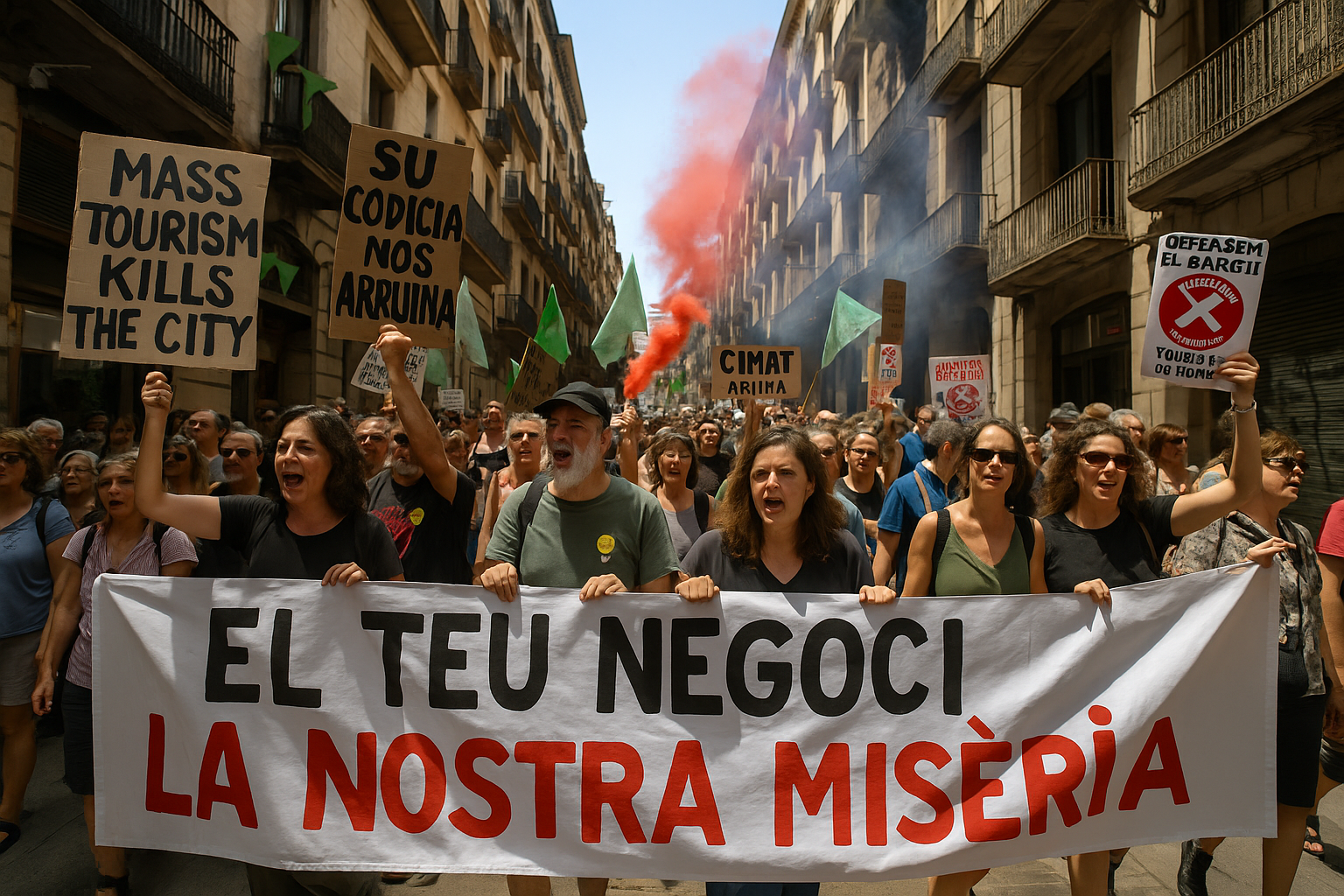Southern Europe Unites in Protest Against Overtourism: Thousands Demand Limits on Mass Tourism in Barcelona, Venice, and Beyond
BARCELONA, SPAIN — On June 15, 2025, thousands of protesters across Southern Europe took to the streets in a synchronized movement demanding urgent action against overtourism. The wave of demonstrations, most notably in Barcelona, Venice, Naples, and Lisbon, was spearheaded by the activist coalition SET (Sud d’Europa contra la Turistització)—which translates to Southern Europe against Overtourism.
With chants of “Your holidays, my misery” echoing through Barcelona’s historic Gothic Quarter, demonstrators armed with water pistols, colored smoke, and anti-tourism slogans voiced growing frustrations over the unsustainable scale of tourism in their cities. Protesters plastered local shops and hotels with stickers reading “Neighbourhood self-defence, tourist go home”, emphasizing their stance against what they view as a systematic displacement of locals for tourist profit.
Why Are Residents Protesting?
Barcelona, with a population of just 1.6 million, hosted over 26 million tourists in 2024, making it one of the most-visited cities in Europe. Residents argue that this level of tourism is not just overwhelming public spaces, but is also escalating the cost of housing, pushing out long-term residents, and overburdening public infrastructure.
“We are tired of being the background scenery for someone else’s Instagram vacation,” said Eva Vilaseca, a 38-year-old activist who joined the Barcelona march. “This city is our home, not a theme park. We need fewer tourists—not more hotels.”
Protesters also reject the argument that tourism is essential to the economy. “Tourism brings jobs, yes, but at what cost?” said Vilaseca. “Low wages, housing insecurity, and overcrowded hospitals and transit are not prosperity.”
Where Did the Protests Happen?
While Barcelona served as the epicenter, simultaneous protests unfolded in several other tourist-heavy locations across Spain, Italy, and Portugal:
Spain
- Ibiza: Residents called out luxury tourism’s effect on local pricing and water consumption.
- Palma de Mallorca: Protesters rallied against cruise ship arrivals and short-term vacation rentals.
- Malaga & Granada: Demonstrations highlighted the transformation of historic centers into “tourist-only zones.”
- San Sebastián: Anti-Airbnb messages dominated banners demanding regulation.
Italy
- Venice: Local groups protested two upcoming hotel developments set to add over 1,500 new beds, worsening the city’s crowding issues.
- Genoa, Naples, Palermo, Milan: Protests highlighted gentrification, rental spikes, and loss of community spaces due to unchecked tourism.
Portugal
- While smaller in scale, cities like Lisbon and Porto saw participation from community groups aligning with the SET platform.
The SET Alliance: A United Front
The SET alliance was formed to unify grassroots groups across Southern Europe that are tackling similar issues under different local contexts. These include:
- Rising rental costs due to short-term tourist accommodations
- Conversion of residential buildings into hotels or vacation apartments
- Loss of local services, such as markets and schools
- Environmental degradation, especially in coastal and island communities
The SET movement calls for a “radical economic shift” away from tourism dependency and urges governments to invest in sustainable industries and protect residents’ rights to housing and public space.
Barcelona’s Policy Shift: Too Little, Too Late?
Barcelona’s city council has taken steps to address overtourism. In 2024, the local government announced plans to ban tourist apartment rentals by 2028, a move aimed at making housing more accessible to locals. However, activists argue the policy is too delayed and lacks enforcement mechanisms in the short term.
Furthermore, despite these announcements, the city continues to approve licenses for hotel expansions and cruise terminals, undermining public confidence in its commitment to curb tourist volume.
According to Ajuntament de Barcelona (City Council), only 600 people officially participated in the June 15 protest. However, SET organizers and local media estimate numbers were significantly higher, with thousands mobilizing across neighborhoods and city squares.
Tourism vs. Livability: A Delicate Balance
Tourism has long been a critical part of Southern Europe’s economy. According to the World Travel & Tourism Council (WTTC), tourism contributed over 12% of Spain’s GDP and supported 2.7 million jobs in 2023. But activists argue that current models are extractive and unsustainable, favoring investors and developers over everyday citizens.
Cities like Venice have already introduced tourist entry fees and daily visitor limits. Similar discussions are underway in Barcelona, where zoning regulations and tourist taxes may be further tightened.
Looking Ahead: Can Tourism Be Reimagined?
The June 15 demonstrations mark a significant moment in Europe’s growing anti-overtourism movement. With governments under increasing pressure to act, the challenge now is to reimagine tourism in a way that respects local residents, protects cultural heritage, and preserves environmental integrity.
Activists are calling for:
- Caps on daily tourist entries
- Permanent limits on short-term rentals
- Reinvestment in local housing
- Diversification of urban economies
As Barcelona prepares for another busy summer season, the protest’s message is clear: Southern Europe is at a tipping point—and residents want their cities back.
For more travel news like this, keep reading Global Travel Wire

















